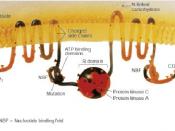Cystic Fibrosis
Cystic fibrosis is an incurable hereditary disorder (disease) that mainly affects the respiratory system (airways and the lungs) and the digestive system (stomach, intestines, colon and other organs involved in the digestive process). Cystic fibrosis involves changes in the chemical properties of mucus, causing thicker-than-normal mucus that can lead to obstructions in the respiratory and digestive systems.
In the respiratory system, the abnormal mucus obstructs airways and also creates conditions that lead to repeated infections in the lungs, which leads to breathing problems, infections and ultimately, death.
In the digestive system, the abnormal mucus can obstruct ducts in organs involved in digestion. Cystic fibrosis can interfere with the normal processes of the liver, the pancreas (the organ that secretes the hormone insulin, which the body uses to break down sugar and that produces digestive enzymes) as well as other organs that are part of the digestive process. This makes it difficult for persons with cystic fibrosis to effectively digest food and absorb nutrients.
The disease is also characterized by a defect in the cystic fibrosis transmembrane conductance regulator (CFTR) gene. This results in irregular chloride and sodium ion conductance in epithelial cells of a number of different organ systems. This means that it prevents salts from moving through body tissues properly, disrupting digestion and more importantly leading to chronic lung infection.
Cystic fibrosis is a recessive genetic disorder and is the most common life-threatening genetic illness in the majority of Caucasian countries. If both parents are carriers of the defective cystic fibrosis gene, their child has a 25 percent chance of inheriting both those genes and developing the disease. If only one abnormal gene is inherited (that is, from only one parent), the child will not have symptoms of the disease but will be capable of passing on...


